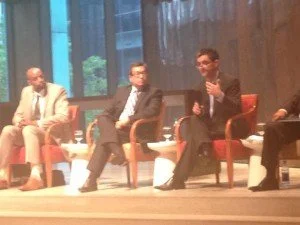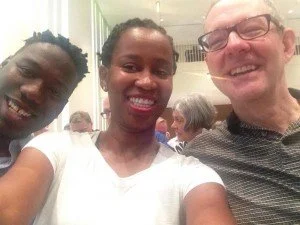Racial Justice and the Vocabulary of Faith
09-19-2016
By Denguhlanga Julia Kapilango
This week my mind has been left to reflect on ‘Racial Justice and the Vocabulary of Faith’ presentation by Dr. Yolanda Pierce. Dr. Yolanda Pierce spoke in a small language that only people of privilege and high education could understand. Terms such as soteriology, eschatology, and ecclesiology were used, in one’s observation to soften the truthful blow of how holy ecumenical churches and their congregations have practiced racism for centuries. On this past June, the 44th General Assembly of the Presbyterian Church in American released a “recognize, confess, condemn and repent of corporate and historical sins, including those committed during the Civil Rights era, and continuing racial sins of ourselves and our fathers (pcaac.org, 2016).”
It is disturbing to know that my great-grandmother and great-grandfather on my mother’s side as well as their children were taught and delivered a racist spiritual religion that deems them a curse or seen broken. Dr. Pierce pointed out that many Blacks did not feel safe or secure within the White church based on sublime signs of whitewashing and hate. Blacks being forced to sing songs that uplift the benefits of being white as snow made one closer to God. One being Black is considered darkness or something evil.
This excellent presentation challenges White congregational leadership to look at the way race and the vocabulary of faith takes a leading role in teaching and preaching salvation as well as grace. To some Whites, grace is seen for Blacks here in America as being kidnapped and sold into ‘the land of the free and the brave’ or ‘the American Dream.’ Other Whites, hide behind their faith, using it as a way to interact with Blacks only in church settings or through sugar coated Anti-racism organizations. But not in the real world standing side by side with Blacks providing productive resources for racial economic and spiritual justice.
Spiritual justice was a term that emerged for me after attending 4th Presbyterian Church’s Racial Justice and the Vocabulary of Faith Panel and Presentation in partnership with Princeton University. Dr. Frank Yamada and Professor Reggie Williams were part of the historical panel. From this, four questions came to mind. The first, how is the academic setting engaging spiritual justice in the classroom and with their scholars, professors as well as staff? Has taking a racial justice approach made the church only accountable for the spiritually terrifying ordeals Blacks have encountered since chattel theft? What accountability do the academic intuitions have in the conversation? The academic institution is the educational foundation for spiritual racism.
The story of the Bible and its founding hierarchy came from European White Privilege timelines. Words used today in the teaching of divinity get inserted into parts of ancient history that never had a presence. Blacks are thrown into the Biblical and Christian narrative to appease their continue craving to serve the church that got built on massive theft, human kidnapping, lying and death of Black Lives. The Roman-Greco Church is highlighted time after time for its organizational skills in the construction of our Christian Faith. Kudos for White Privilege!
Dr. Pierce was asked the question ‘What can churches with affluent White Privilege do to address Reparations for Blacks? In summary, one should not think of reparations as going all the way back to 1619. When thinking about reparations, reflect on the current issues that are affecting Black Communities such as redlining or changing property tax laws. I challenge affluent communities of White Privilege to go even further. Find local Black members of your congregation and help them to establish a higher credit score, co-sign and provide philanthropic mentorship programs to support Blacks to achieve a greater sense of upward mobility. Stop thinking that giving to local charities or foundations will remove this hidden layer of spiritual, racial oppression. As long as Blacks get placed in a continual secret perspective of being unchurched, uneducated, unemployed and uncivilized, the body of Christ will never grow. The True Gospel will never get to the next generations. We must go deeper together to heal our whole nation if we are truly one body in Christ.



